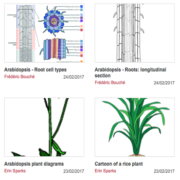
Images for Impact – How-to tips. Created for the Plantae Seminar Series
Blog, Careers, Careers - Blog, Education, Education General, Science Communication, Skills and Advice, Writing/Reviewing/Publishing/Communicating
Earlier this year I gave a Plantae seminar on "Images for Impact" - simple, free tips about how to source and create images to use in your science writing and communicating.
Here is the text of the handout I created to accompany the seminar. You can get this as a PDF here. You can download the…

Ten simple rules for writing a response to reviewers
Blog, Careers, Careers - Blog, Skills and Advice, Writing/Reviewing/Publishing/CommunicatingAnother excellent entry in PLOS Computational Biology's "Ten Simple Rules" series.
Read "Ten simple rules for writing a response to reviewers" here.
Short version:
Rule 1: Provide an overview, then quote the full set of reviews
Rule 2: Be polite and respectful of all reviewers
Rule 3: Accept…

How Academics Survive the Writing Grind: Some Anecdotal Advice
Skills and Advice, Writing/Reviewing/Publishing/CommunicatingWords of Wisdom from Those Who Publish (and Do Not Perish)
By Helen Sword
A PhD student approached me after a writing workshop to recount his tale of woe. “I write these messy, incoherent first drafts,” he lamented. “They’re absolutely awful! Then I have to work on them for hours and hours…

How to Review a Manuscript, from MBoC
Careers, Careers - Blog, Skills and Advice, Writing/Reviewing/Publishing/Communicating0 Comments
/
A 2011 editorial from the journal Molecular Biology of the Cell (MBoC).
Any jackass can trash a manuscript, but it takes good scholarship to create one (how MBoC promotes civil and constructive peer review)
http://www.molbiolcell.org/content/22/5/525.long
Key points:
Review a manuscript only…

Alan Alda's Experiment: Helping Scientists Learn To Talk To The Rest Of Us
Blog, Careers, Education, Education General, Skills and Advice, Writing/Reviewing/Publishing/CommunicatingAn NPR interview with Alan Alda about his efforts to help scientists learn to communicate.
"People are dying because we can't communicate in ways that allow us to understand one another," he writes. "It sounds like an exaggeration, but I don't think it is. When patients can't relate to their doctors…

Why can't scientists be better communicators? (SciAm blog)
Blog, Careers, Education General Public, Skills and Advice, Writing/Reviewing/Publishing/Communicating
Author Katherine Wu highlights some of the challenges that interfere with scientists communicating.
She says, "Both scientists and non-scientists must commit to not only communication, but also a drastic reassessment of how we communicate with each other. I believe mending the rift starts with…

A community repository of plant illustrations
Blog, Research Blog, Writing/Reviewing/Publishing/CommunicatingGuest post by Erin Sparks, Guillaume Lobet, Larry York and Frédéric Bouché
It is midnight on a cold winter evening and you are scheduled to give a seminar at 8 am the next morning. All you are missing to complete your presentation is one last graphic to illustrate your conclusions. You wearily…

Plain-language summaries of research
Blog, Careers, Careers - Blog, Skills and Advice, Writing/Reviewing/Publishing/CommunicatingThe editorial team at eLIFE has shared some of their tips for writing about your research in an accessible way. In addition to reporting on the outcomes of their plain-language summaries (eLIFE Digests), they provide an excellent set of guidelines to help you write your own plain-language summary. All…

Communication: Antisocial media (Nature Careers)
Careers, Careers - Blog, Writing/Reviewing/Publishing/CommunicatingCommunicating about science (or anything) on social media sites can expose you to rudeness and worse. In this column by Amber Dance from Nature Careers, several high-profile scientists and science communicators share how they avoid and cope with conflicts.
Read more here.

